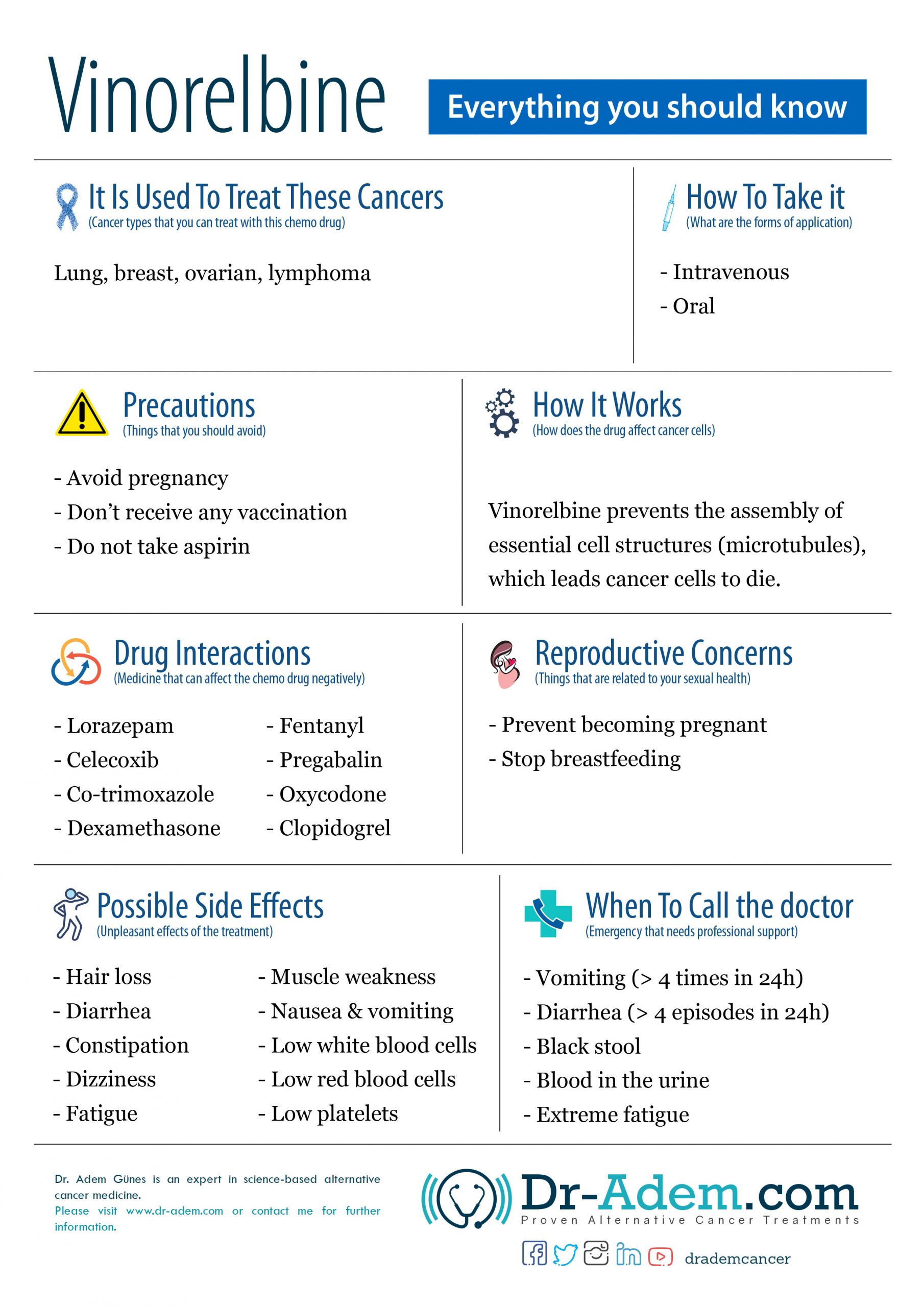Fact Sheet – Everything You Should Know
In this Vinorelbine fact sheet, you’ll get to know about the precautions, usage, possible side effects, and the types of cancer that you can treat with this chemo drug.

Embed this Infographic on your site:
<a href='https://dr-adem.com/vinorelbine-fact-sheet/'><img src='https://dr-adem.com/wp-content/uploads/2019/11/Vinorelbine2-scaled.jpg' alt='Vinorelbine Fact Sheet'/></a>Here’s the Vinorelbine fact sheet to get detailed information about Vinorelbine
It Is Used To Treat These Cancers
(Cancer types that you can treat with this chemo drug)
- Lung
- Breast
- Ovarian
- Lymphoma
How To Take it
(What are the forms of application)
- Intravenous
- Oral
Precautions
(Things that you should avoid)
- Avoid pregnancy
- Don’t receive any vaccination
- Do not take aspirin
Mechanism of Action of Vinorelbine
(How does the drug affect cancer cells)
Vinorelbine is a mitose inhibitor (vinca-alkaloid subgroup). It binds to the microtubules (microcellular structures, which give the cells its form and structure) and destroys the tubulin (one of the proteins which make the microtubules) during the metaphase of the mitosis (cell division process), halting its progress.
Drug Interactions
(Medicine that can affect the chemo drug negatively)
- Lorazepam (anti-anxiety, anti-seizure)
- Celecoxib (pain killer)
- Co-trimoxazole (antibiotic)
- Dexamethasone (steroid)
- Fentanyl (pain killer)
- Pregabalin (against neuropathic pain, epilepsy)
- Oxycodone (pain killer)
- Clopidogrel (antiplatelet medication)
Reproductive Concerns
(Things that are related to your sexual health)
- Pregnancy prevention during and until 6 months after the treatment (men and women)
- Stop breastfeeding
- Consider sperm freezing if willing to bear children
Possible Side Effects
(Unpleasant effects of the treatment)
- Hair loss
- Irritation at the infusion site
- Skin rash
- Neurotoxicity (peripheric neuropathy)
- Mouth ulcers
- Diarrhea
- Constipation
- Dizziness
- Fatigue
- Muscle weakness and pain
- Joint pain
- Nausea & vomiting
- Liver toxicity
- Low white blood cells: raise the risk of bacterial infection
- Low red blood cells: can lead to fatigue, general lack of interest and drive to be active
- Low platelets: can lead to bleeding (nose, gums) and in extreme cases to internal bleeding (intestinal, brain, joints)
- Infertility
When To Call the doctor
(Emergency that needs professional support)
- Vomiting (>4 times in 24h): can lead to severe dehydration and electrolyte disbalance
- Diarrhea (>4 episodes in 24h): can also lead to severe dehydration and electrolyte disbalance
- Black stool: can be a sign of intestinal bleeding
- Blood in the urine
- Extreme fatigue: can be a sign of severe anemia (low blood cells)
- Fever > 37,8°C


